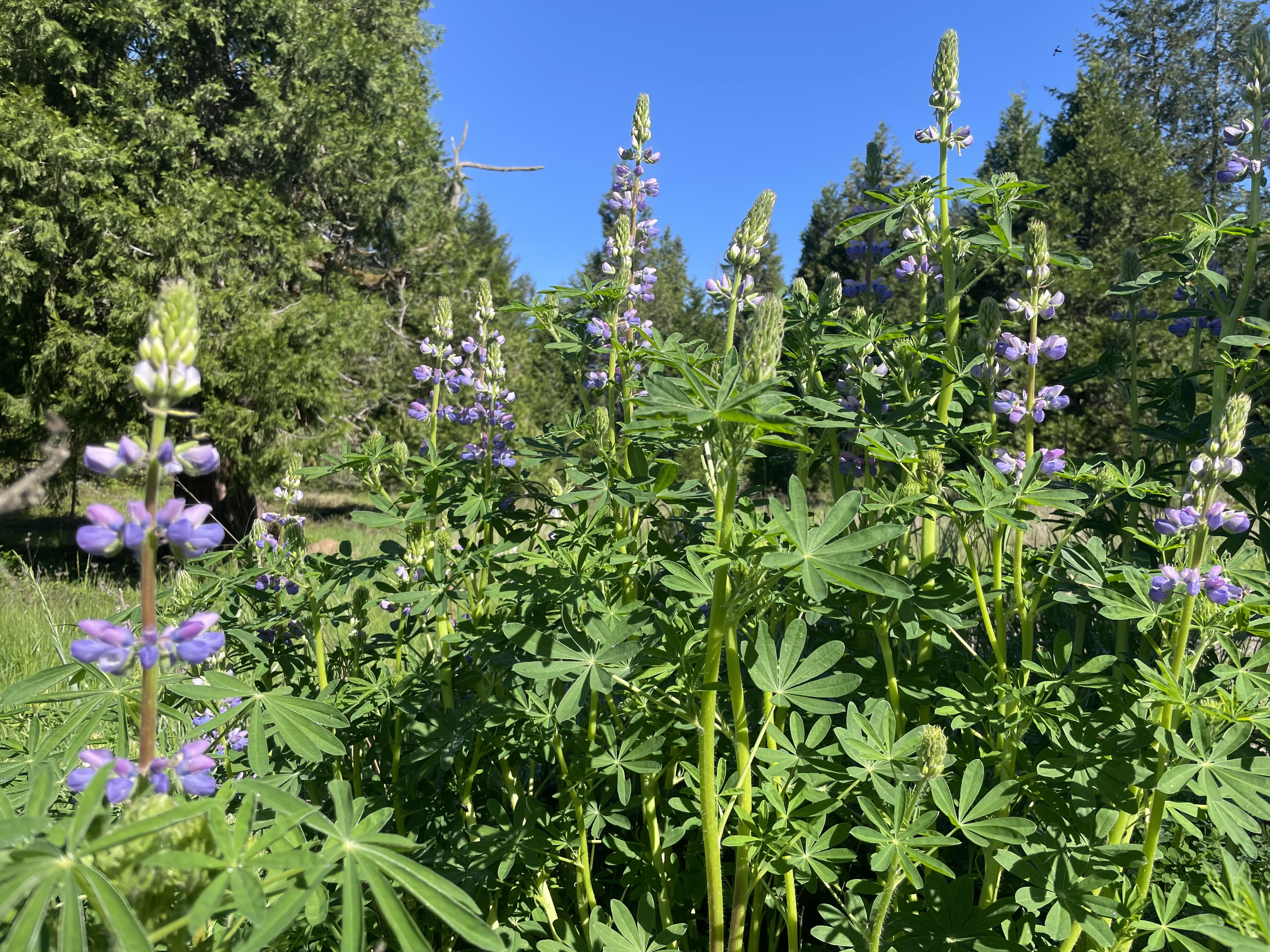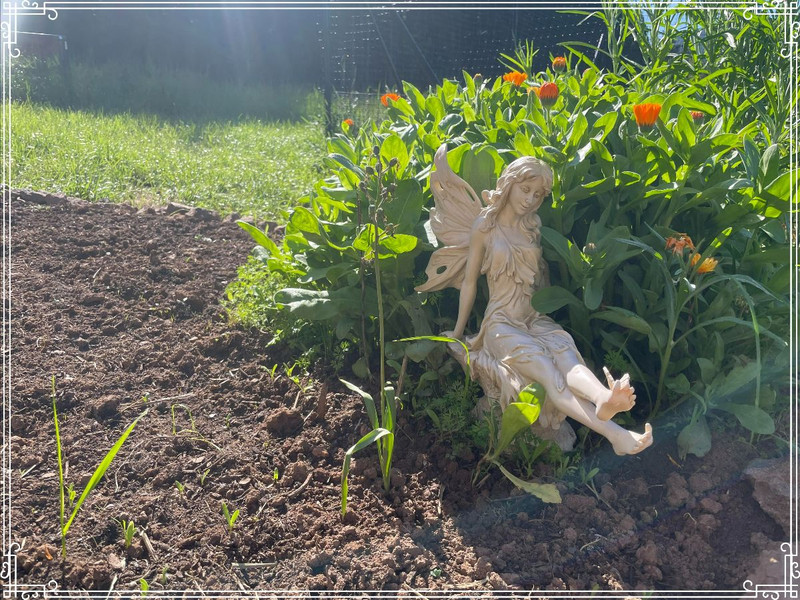Spring is finally fully here in the Northwest. The cold kept us all moving in slow motion, and in now seemingly in a blink of an eye, the flowers are all blooming and all the weeds are sprouting. In fact, we're supposed to get into the 90s this weekend at the nursery, which is record breaking for this early in the year. Nature is getting more and more dynamic, and for some of us, our emotional lives are following suit.
For those of us lucky enough to have our own gardens, we can be grateful. When I teach meditation, I often begin by having people find a refuge within themselves, often somewhere in their bodies. When I share about gardening, I often think the same way. Where in your garden is a refuge for your mind and heart? Thinking this way makes your garden a special place. It restores the sacred in our lives, and brings that energy into the food or flowers or whatever it is we grow.
My partner planted a new flower bed this year, placed a small statue in it, and goes there to reflect. She swears her garden saved her. The same is true for so many of us. Indeed, science continues to affirm what many of us gardeners already know in our hearts: spending time out in the garden and in nature has amazing positive effects, as shown from a growing body of international research studies. In sum, enjoying nature can reduce stress, increase happiness, and give the body, heart, and mind the support to heal. Believe it or not, horticultural therapy has been practiced for over 200 years, and is happening more and more in schools, neighborhoods, businesses, and mental health institutions.
Within mental illness at an all-time here, and with the world seemingly careening towards greater chaos, there has perhaps never been a greater need for healing gardens. These are places we can go that remind us of who we are deeper down, underneath the busyness and preoccupations of our busy lives. When we combine these visits to natural places with mindfulness practices, we increase the healing potential ten fold. Below are a series of simple suggestions for you to try out, but I encourage you to make them your own.

Mindfulness Practices for Gardeners: Building in pauses in our gardening lives.
- Crossing the Threshold. The first moment for mindfulness in gardening is stepping out the door. When I used to live in a Zen Center, one of the mindfulness practices was to always step over the double door threshold to the Zendo with the outer foot. While I found this somewhat trite at first, I came to realize that it snapped the mind and heart awake into a different kind of attention. Instead of rushing to accomplish something, consider taking a pause as you exit your door to your garden. Perhaps take a full breath, feel your feet on the ground, the clothes on your skin. Remember that nature is a sacred place and the garden can be an easeful refuge for us.
- Taking in the Elements. Before you start looking intently at what there is to do, or begin getting your hands dirty, take another moment here. You can keep standing, or sit down. Bring the body into stillness, close your eyes for a moment, and take a deep breath. Smell the air, feel it on your skin. Listen to the sounds of the birds. Open your eyes now and take in the landscape. No matter where you live, there are signs of life to see and be grateful for.
- Touching the Earth. Whether through weeding, tilling, planting, or mulching, touching the soil is a special part of the gardening experience. This "skin" of the Earth contains an incomprehensible amount of life - trillions of tiny roots, insects, and beneficial bacteria and fungus. Countless tiny pores for water and air and traveling creatures. The first time we dig into the soil in a day is another great time to pause. We can kneel down and touch it, break it apart and examine it in our hands, feel the texture and moisture, say hi to the worms, give it a smell. The soil is alive, supports all of us, and is a miracle to behold.
- Minding our Breath. Throughout our gardening activities, mindfulness can help us stay present in our bodies. This helps to keep us calm, centered, and connected. No matter the activity, we can remind ourselves to periodically tune into our breath. Breathing while pushing the wheelbarrow, breathing while planting seeds, breathing while removing weeds or pruning out dead growth. In through the nostrils, down into the belly, and back out again. The breath is always a companion on our gardening journey.
- Caring for our Plants. Some of the most nourishing moments in the garden for me are working directly with the plants. Sowing seeds, planting seedlings, weeding, watering, pruning, mulching - each of these can practiced and felt in the heart as an act of love and care. We can even offer kind wishes, silently or aloud, to our plants as we tend to them. "May you be healthy and strong, may you be happy and peaceful." Bringing warmth into our hearts during the gardening process helps us stay present, enjoy our experience, and remind us what life is really all about: tending with kindness to the interrelationships that nourish us.
- Loving what is. It's all too easy to notice the brown spot in the lawn, the pile of unmoved brush here and there, the weeds in the garden. It's easy to notice some element of your neighbor’ yard that seems more kept or beautiful. Noticing all of this is fine, as long as you're also loving your garden (and yourself) just as it is – in its’ perfect imperfection. Gardening is a process, Nature is naturally messy, and we don't have to be in control. We can enjoy the natural flow of life in our gardens, with gratitude for the simple joys of living.
Big-Picture Reminders:
When we make space to observe the patterns and processes that are alive in the garden, gardening doesn't just relax us or soothe us. It can also provide us with healing insights that may transform the rest of our lives. By reflecting on the three characteristics below, over time, we gain an even greater sense of peace in our lives and in our place in the universe.
- Interdependence. We don’t have too look far into our gardens to see that all parts are connected to one another, balance one another, and eventually become one another. This couldn’t be more true than the relationship between our lungs and the trees, exchanging life-giving gases on a moment to moment basis; or between the decay and life in a compost pile. These myriad examples remind us that we too are part of this intricate web of life, that we have a home amidst the natural world, and that we can never be alone. This is a crucial reminder in our society so often rife with division and loneliness.
- Change. From morning to night, season to season, and year to year, the garden teaches us about the cycles of life. From the passing of weather to the life and death of plants and animals, our gardens ceaselessly teach us about the natural flow of change. Seeing this clearly, we can come into greater acceptance of the natural unfolding of our own lives, from birth to adolescence to maturity and to death. We can allow the unresolved or uncomfortable things in our life or in our minds greater acceptance and spaciousness, knowing that all things inevitably change.
- Contentment. One of a garden's most subtle yet powerful lessons is in the presence of the wild things themselves – the way the trees hold themselves, the expanse of the big open sky, the swift and mindful movements of the animal world. Indeed, nature can transmit it’s silent, still, and spacious presence to us as a constant example, reminding us that that same presence lives within us, as we too are part of that same nature. This understanding can give us access to a space of calm and contentment even amidst the busyness and pressure of daily life – a priceless gift.
- So, whatever the state of your garden this year, try seeing it as an opportunity to not just take a break from the rest of your life, but to deepen your overall well-being, to heal the pain that you hold, and to learn more about yourself and all of life. Be creative, practice joy. Don't worry about the way it looks, just tend to the way it feels for you, and the rest will follow.
Enjoy the season.Sincerely, Justin Michelson
